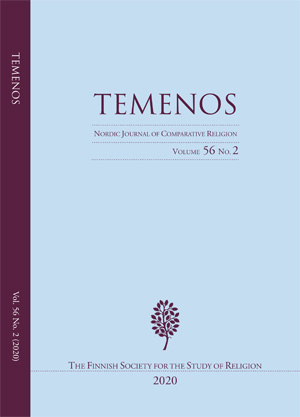"A Prophet Has No Honor in the Prophet’s Own Country"
How Russian is Russian Evangelicalism?
DOI:
https://doi.org/10.33356/temenos.75254Keywords:
Russian evangelical Christianity, glocalization, quinque solae, Russian Synodal BibleAbstract
The article discusses how the history of forced marginality and isolation of the Russian-speaking Evangelical Christians shaped their theology and social ministry. Russian Evangelicalism is a glocal phenomenon. It fully adheres to the universal Evangelical tenets and, at the same time, it is shaped as a socioculturally and linguistically Russian phenomenon. Its russianness is manifested in the construction of the Russian Evangelical narrative, formulated as a response to the cultural and political discourse of the modern Russia and to the Orthodox theology and application, as it is seen by evangelicals. This narrative is constructed with the language of the Synodal Bible in its present-day interpretation.
Russian evangelicals are constantly accused of being Western-influenced, proselytizing in the canonical land of the Russian Orthodox Church, and mistreating and misleading people. The article also argues agains these accusations, emphasizing the history, hermeneutics, and social ministries of Russian Evangelicalism.

Downloads
Published
How to Cite
Issue
Section
License
Copyright (c) 2020 Igor Mikeshin

This work is licensed under a Creative Commons Attribution 4.0 International License.
Author's Guarantee
- The Author acknowledges that the Work will be publicly accessible on the Internet and that such access will be free of charge for the readers.
- The Author guarantees that the Work is her/his original work that has not been published before and cannot be construed as copying or plagiarism. Furthermore, the Author confirms that the Work contains no statement that is unlawful, defamatory or abusive or in any way infringes the rights of others.
- The Author confirms that she/he has secured all written permissions needed for the reproduction in the Publication of any material created by a third party.
User Rights
Under the CC BY 4.0 license, the Author/s and users are free to:
- Share — copy and redistribute the material in any medium or format,
- Adapt — remix, transform, and build upon the material for any purpose, even commercially,
- However, the Work must be attributed to the original Author and source of publication.
The license of the published metadata is Creative Commons CCO 1.0 Universal (CC0 1.0)
Author Rights
The Authors maintain the right to:
- copyright, and other proprietary rights relating to the Work,
- the right to use the substance of the Work in future own works,
- the right to self-archiving/parallel publishing (publisher's PDF allowed).
Rights of Publisher
- The Publisher reserves the right to make such editorial changes as may be necessary to make the Work suitable for publication in the publication, e.g. style of punctuation, spelling, headings and the like.
- The Publisher will publish the Work if the editorial process is successfully completed and reserves the right not to proceed with publication for whatever reason.
- The publication entitles the author to no royalties or other fees. This agreement will be governed by the laws of Finland.






